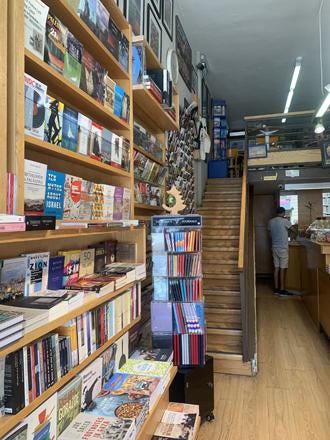I remember walking through the neighborhoods of East Jerusalem on a warm summer night with my husband and my friend Joy, almost as if it was a sacred pilgrimage. We were headed to a bookshop. But not just any bookshop. We were headed to The Educational Bookshop, a world famous Palestinian bookshop that has long been a favorite stop for diplomats, pilgrims, activists, tourists, and scholars alike. It surprises me now that I neglected to write about this stop when I was actively blogging about my trip, but perhaps I was just thinking that a story about a visit to a bookstore wouldn’t have been that interesting to people.
But perhaps it’s taken on more interest now. Now that the bookstore has been raided and the owners detained by the Israeli military. It’s both hard for me to believe, and easy to understand. It’s hard to believe, because on the one hand, it’s just a bookshop. They don’t recruit terrorists or assemble rockets. They don’t engage in violence of any kind. They sell books and serve tea. It’s hard to believe they would be a target of a military raid. Yet it’s easy to understand, because on the hand, bookshops are never just bookshops. The best bookshops are sacred spaces ripe for disruption, transformation, and revolution. They are peaceful places, but they are also places where the “peace” of the status quo is revealed as an illusion, paving the way for an uprising of the mind. They are places where we learn to decolonize our minds. And that is more dangerous than any rocket or gun.
Bookshops are dangerous places. Still, when I think back to my own visit to The Educational Bookshop, it hardly felt dangerous. It felt safe, warm, and cozy. While Joy and I perused the shelves, my husband got a piece of cake and a tea, and settled in looking at cookbooks on the second floor. Joy knew exactly what book she was looking for— Fatal Embrace, by Marc Braverman. Unfortunately, the store didn’t appear to have it in stock. We asked the sales attendant, and he said that he would call over to their other store to see if they had it there. The other store did in fact have a copy, and within 20 minutes, there was a man on a motorbike outside the door with the copy in his hand. I was blown away by the deep hospitality ingrained in that small gesture.
Meanwhile, I was still trying to decide what book to buy. I was limited by a lack of suitcase space, so I had to be judicious about my purchase. Eventually, my eyes fell on a stack of books at the front counter, with a sign next to them saying, ‘signed by the author.’ It was Ahed Tamimi’s new memoir, They Called Me a Lioness. In that moment I knew— that was the book I would buy. A signed copy of the first book of a woman who I have no doubt will become indispensable in the fight for a free Palestine? Yes, please.
It’s makes me incredibly sad that things have deteriorated to the point that Israel would raid this beautiful little shop. It also makes me incredibly angry, because I know that there will be no repercussions for Israel’s actions. No apologies will be issued to the store or its owners. No reparations made for lost, stolen, or damaged stock. So I feel sad and angry. But I also feel newly defiant. Seeing the pictures of diplomats and activists demonstrating outside the raided bookshop, boldly declaring their support for this Palestinian institution, actually brings hope to my heart. It makes me feel proud to be part of this movement— a movement that at its core, is a movement about decolonizing our minds, hearts, and souls from the grip of empires of domination and colonization. It’s about so much more than who gets to control a strip of land. The movement is a laboratory for testing the efficacy of international law and testing the depth of our common morality. The movement is everything.
The movement is everything, and it lives in that little bookshop in East Jerusalem. So maybe it’s not so safe, after all. Long live The Educational Bookshop.





I loved this glimpse into your memory box. Such a moving tribute to an institution of the community.